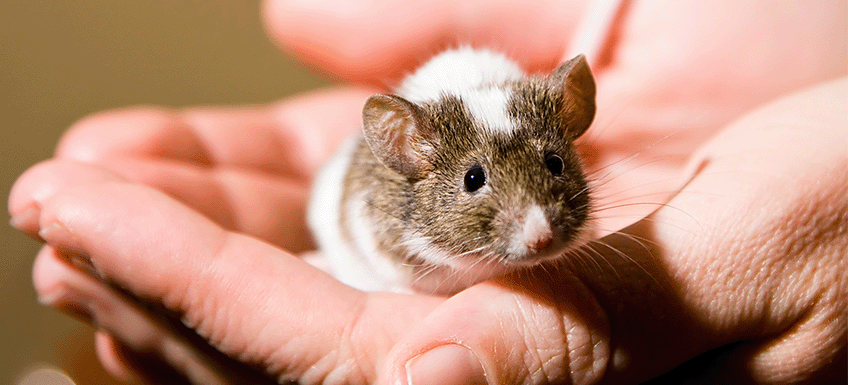
How to Care For a Pet Mouse
Care
Small Animals
11/05/2023
The mighty mouse is both loved and loathed. Real and fictional mice have enchanted children and adults throughout the ages, and even terrified some. But pet mice are curious creatures and provide a delightful introduction to pet ownership for young members of the family.
Mouse facts:
Female: Doe
Male: Buck
Babies: Pinkies
Cost: $8-10
Average lifespan: Two years
Breeding: A pair of mice can be produce up to 135 pinkies a year
The Basics of Owning a Mouse
Before bringing a pet mouse home, it's important to set up a proper living environment. A spacious cage with plenty of room for them to move around and play is essential. The cage should also have bedding for them to burrow in, as well as a water bottle and food dish. It's important to clean the cage regularly to prevent any odors and to maintain a healthy environment for your mouse.
Your next step will be heading to the pet shop. Modern pet shops are like an Aladdin’s cave, with all sorts of mousey treasures. If you’re buying your first mouse, you can pick up a mouse starter kit for around $70, then the only other items you’ll need are the mouse and its house. Perusing the shop will reveal a range of mouse mansions that look fantastic and will provide your mouse with a fun and safe environment.
If you decide to buy a second-hand cage, it’s best to inspect it before parting with your cash. The cage needs to be secure to keep large paws out, and your pet in. If you settle on an aquarium for your mouse, make sure the lid has adequate ventilation and is secure, and keep it out of direct sunlight.
The cage needs to be lined – use newspaper or purchase lining from your pet shop. Bedding is then placed on top of the lining. This can be fresh hay or shredded newspaper. Fine sawdust should be avoided as this may cause respiratory problems and can be poisonous if made from tanalised timber. Pet shops offer a range of safe bedding and nesting material. Mice also need a small nesting box in which to enjoy some ‘me time’, and this should be placed away from the feeding area.
Playtime With Your Mouse
Toys are also important as they work to exercise your pet, keeping it happy and healthy. The fantastic range on offer includes exercise wheels, hammocks, rope ladders, hanging mats, ‘critter rollers’ and see-saws. Of course, the young mouse owner can use a little imagination to kit out their mouse house. Cardboard tubes, small branches and jars can also be used, but just check they’re clean and placed safely.
Mice are sociable creatures, so ideally buy two. Double check with your pet shop owner or breeder that you have two same-sexed mice or you might become an inadvertent mouse breeder; two females are less likely to fight, and are not quite as smelly as the boys. It's also important to interact with them regularly. However, be careful when handling them as they are delicate creatures and can easily be injured.
Don’t cage mice and rats together, as the rat sees its smaller cousin as a meal.
Feeding Your Mouse
If you imagine cheese is the ideal meal for a mouse, think again. It’s high in fat, so only tiny amounts should be given as a special treat. A healthy diet includes fresh vegetables, oats, uncooked rice, bread crusts, sunflower seeds, and you can buy pre-packed mouse food. Mice have a high metabolic rate and need to have fresh food and water on hand 24 hours a day. A water bottle is an essential item in the cage and it should be freshened daily.
Mice are rodents and need something to gnaw on to avoid the problem of overgrown teeth. Dog biscuits, pieces of beef bone, small pieces of untreated wood or chew toys can all keep teeth in check.
Have somewhere safe to keep your mouse while cleaning out its cage. The cage should be thoroughly cleaned out at least once a week, with droppings, soiled or urine-sodden bedding and uneaten food removed daily. Mice are very clean animals and toilet away from their eating and bedding area.
Training Your Pet Mouse
So you have your mouse in its fully fitted out house – what now? Mouse owners can become mouse trainers. Mice are not as easy to train as rats, but with a bit of patience, it won’t be long before your pet is literally in the palm of your hand.
To train your mouse to climb into your hand when you call it, start by building up trust – handle it gently, picking it up slowly and holding it by the base of its tail. Mice rely more on their sense of smell than their eyesight, so it’s important to allow your pet time to get used to your scent.
Lure your mouse into your hand by holding treats in your palm – if your mouse is nervous, lay your hand inside its cage when you do this, so the environment is familiar. Once it trusts you enough to eat the treats from your hand, start to make a distinctive sound each time you give it a treat. Try a whistle, click or kissing noise. Be patient, and gradually your pet will come to associate your sound with treats, and will approach you whenever you make the sound.
What kind of owner would a mouse be perfect for?
Pocket-sized but full of fun, a mouse might prove to be the perfect pet for the smaller pet owner or a space-challenged animal lover.
Mice make great pets for those who are looking for a low-maintenance but still interactive companion. They're are also great for children who are interested in learning about pet care and responsibility
Fun Facts About Mice
- Mice were domesticated more than a century ago.
- Walt Disney won an Oscar for creating Mickey Mouse.
- The famous spy Nancy Wake, the most decorated woman in the Second World War, had the code name ‘The White Mouse’.
- The world’s oldest known mouse, Yoda, lived for more than four years.
- Contrary to popular belief, mice are very clean, often organising their homes into separate areas for food, sleeping and bathroom purposes.

Written by The Pet.co.nz
Team
Written by The Pet.co.nz Team
A team of specialists with backgrounds in animal nursing, animal care, and all things pet related.